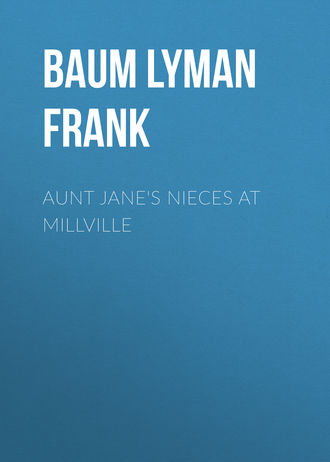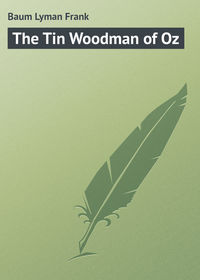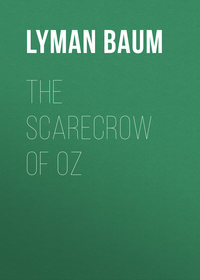 полная версия
полная версияAunt Jane's Nieces at Millville
The Major started at once, and Uncle John continued: "I don't know whether this arrangement suits you or not, Joseph, but it suits me; and, as a matter of fact, it's none of your business. Feel able to take a ride?"
The boy smiled, gratefully.
"Yes, indeed, Mr. Merrick," said he, and was shrewd enough not to venture a word of thanks.
CHAPTER XVI.
A MATTER OF SPECULATION
Old Hucks, still smiling, but dreadfully nervous over the discovery of Joe, and Mr. Merrick's sudden activity in the boy's behalf, speedily harnessed Daniel and induced the reluctant steed to amble down the path to the cabin. Leaning on Uncle John's arm, the invalid walked to the buggy and was assisted to mount to the seat beside Thomas. Then away they started, and, although Dan obeyed Hucks more willingly than any other driver, the Major and Uncle John walked 'cross-lots and reached the hotel a good fifteen minutes in advance of the equipage.
The Millville Hotel depended almost entirely for patronage upon the commercial travelers who visited the place periodically to sell goods to the merchants, and these did not come too often, because trade was never very energetic and orders never very large. Bob West boarded at the hotel, and so did Ned Long, a "farm hand," who did sundry odd jobs for anyone who needed him, and helped pay his "keep" by working for Mrs. Kebble when not otherwise engaged.
Mrs. Kebble was the landlady, and a famous cook. Kate Kebble, a slatternly girl of sixteen, helped her mother do the work and waited on the table. Chet Kebble, the landlord, was a silent old man, with billy-goat whiskers and one stray eye, which, being constructed of glass, usually assumed a slanting gaze and refused to follow the direction of its fellow. Chet minded the billiard-room, which was mostly patronized Saturday nights, and did a meager business in fire insurance; but he was "so eternal lazy an' shifless," as Mrs. Kebble sharply asserted, that he was considered more a "hanger-on" of the establishment than its recognized head.
The little rooms of the hotel were plainly furnished but maintained with exceptional neatness.
The one in the east corner of the second floor met with the approval of Uncle John and the Major, and was promptly engaged. It was cheerful and sunny, with outlooks on the lake and the village, and contained a lounge as well as the bed.
When the invalid arrived, he was assisted to this apartment and installed as its permanent occupant.
"Any baggage?" asked Mr. Merrick.
"There's a small trunk lying at the Junction," said Joe; "but it contains little of importance."
"Well, make yourself at home, my boy, and get well at your leisure," remarked Uncle John. "Mrs. Kebble has promised to look after you, and the Major and I will stop in now and then and see how you progress."
Then he went out, engaged Nick Thorne to go to the Junction for the boy's trunk, and selected several things at the store that he thought might be useful to the invalid. Afterward he marched home again beside the Major, feeling very well pleased with his morning's work.
When the girls reached home late in the afternoon, they were thrown into a state of great excitement by the news, briefly related by their uncle, that Joseph Wegg had returned to Millville "considerably smashed" by an automobile accident, and was now stopping at the village hotel for repairs.
They refrained from making remarks upon the incident until they were alone, when the secret council of three decided to make Joe Wegg's acquaintance as soon as possible, to discover what light the young man might be able to throw upon the great mystery.
"Do you know, girls," said Louise, impressively, "it almost seems as if fate had sent Joe Wegg here to be an instrument in the detection of the murderer and robber of his poor father."
"If Joe knew about it, why didn't he track the villain down himself?" inquired Patsy.
"Perhaps he hasn't suspected the truth," said Beth. "Often those who are closely concerned with such tragedies do not observe the evidences of crime as clearly as outsiders."
"Where did you get that information?" demanded Patsy.
"From one of Anna Doyle Oppenheim's detective stories," answered Beth, seriously. "I've been reading up on such things, lately."
"Detective stories," said Louise, reflectively, "are only useful in teaching us to observe the evidences of crime. This case, for example, is so intricate and unusual that only by careful thought, and following each thread of evidence to its end, can we hope to bring the criminal to justice."
"That seems to me conceited," observed Miss Doyle, composedly. "Detective stories don't have to stick to facts; or, rather, they can make the facts to be whatever they please. So I don't consider them as useful as they are ornamental. And this isn't a novel, girls; it's mostly suspicion and slander."
"You don't seem able to be in earnest about anything," objected Beth, turning a little red.
"But I try to be." said Patricia.
"We are straying from the subject now under discussion," remarked Louise. "I must say that I feel greatly encouraged by the sudden appearance of the Wegg boy. He may know something of his father's former associates that will enable us to determine the object of the murder and who accomplished it."
"Captain Wegg was killed over three years ago," suggested Miss Doyle, recovering easily from her rebuff. "By this time the murderer may have died or moved to Madagascar."
"He is probably living within our reach, never suspecting that justice is about to overtake him," asserted Louise. "We must certainly go to call upon this Wegg boy, and draw from him such information as we can. I am almost certain that the end is in sight."
"We haven't any positive proof at all, yet," observed Patsy, musingly.
"We have plenty of circumstantial evidence," returned Beth. "There is only one way to explain the facts we have already learned, and the theory we have built up will be a hard one to overthrow. The flight of Captain Wegg to this place, his unhappy wife, the great trouble that old Nora has hinted at, the – "
"The great trouble ought to come first," declared Louise. "It is the foundation upon which rest all the mysterious occurrences following, and once we have learned what the great trouble was, the rest will be plain sailing."
"I agree with you," said Beth; "and perhaps Joseph Wegg will be able to tell us what the trouble was that ruined the lives of his parents, as well as of Old Hucks and his wife, and caused them all to flee here to hide themselves."
It was not until the following morning that the Major found an opportunity to give the confederates a solemn wink to indicate he had news to confide to them. They gathered eagerly on the lawn, and he told them of the finding of Joe Wegg in the isolated cabin, and how old Thomas and Nora, loving the boy as well as if he had been their own child, had sacrificed everything to assist him in his extremity.
"So ye see, my avenging angels, that ye run off the track in the Hucks matter," he added, smiling at their bewildered faces.
Patsy was delighted at this refutation of the slanderous suspicions that Thomas was a miser and his smiling face a mask to hide his innate villainy. The other girls were somewhat depressed by the overthrow of one of their pet theories, and reluctantly admitted that if Hucks had been the robber of his master and old Will Thompson, he would not have striven so eagerly to get enough money to send to Joe Wegg. But they pointed out that the old servant was surely hiding his knowledge of Captain Wegg's past, and could not be induced to clear up that portion of the mystery which he had full knowledge of. So, while he might be personally innocent of the murder or robbery, both Beth and Louise were confident he was attempting to shield the real criminal.
"But who is the real criminal?" inquired Patsy.
"Let us consider," answer Louise, with the calm, businesslike tone she adopted in these matters. "There is the strolling physician, whom we call the Unknown Avenger, for one. A second suspect is the man McNutt, whose nature is so perverted that he would stick at nothing. The third suspicious individual is Mr. Bob West."
"Oh, Louise! Mr. West is so respectable, and so prosperous," exclaimed
Patsy.
"It's a far jump from McNutt to West," added Beth.
"Leaving out Hucks," continued Louise, her eyes sparkling with the delightful excitement of maintaining her theories against odds, "here are three people who might have been concerned in the robbery or murder. Two of them are under our hands; perhaps Joseph Wegg may be able to tell us where to find the third."
They pleaded so hard with the Major to take them to call upon the injured youth that very day, that the old gentleman consented, and, without telling Uncle John of their plans, they drove to Millville in the afternoon and alighted at the hotel.
The Major went first to the boy's room, and found him not only very comfortable, but bright and cheerful in mood.
"At this rate, sir," he said, smilingly, "I shall be able to discharge my guardian in quick time. I'm twice the man I was yesterday."
"I've brought some young ladies to call upon you," announced the Major.
"Will you see them?"
Joe flushed at first, remembering his plastered skull and maimed condition. But he could not well refuse to receive his callers, whom he guessed to be the three girls Old Hucks had praised to him so highly.
"It will give me great pleasure, sir," he replied.
An invalid is usually of interest to women, so it is no wonder that the three young ladies were at once attracted by the bright-faced boy, who reclined upon his couch before the vine-covered windows. They thought of Ethel, too, and did not marvel that the girl grieved over the loss of this friend of her childhood.
Joe had to recount the adventure with the automobile, which led to his injuries, and afterward give an account of his life at the hospital. That led, naturally, to the timely assistance rendered him by the faithful Thomas, so that Louise was able to broach the subject nearest her heart.
"We have been greatly interested in your old servants – whom we acquired with the farm, it seems – and all of us admire their simplicity and sincerity," she began.
"Nora is a dear," added Beth.
"And Thomas is so cheerful that his smile is enough to vanquish any attack of the blues," said Patsy.
"The Hucks are the right sort, and no mistake," declared the Major, taking his cue from the others.
This praise evidently delighted the boy. They could have found no more direct way to win his confidence.
"Nora was my mother's maid from the time she was a mere girl," said he; "and Thomas sailed with my father many years before I was born."
They were a little surprised to hear him speak so frankly. But Louise decided to take advantage of the opening afforded her.
"Nora has told us that some great trouble came to them years ago – a trouble that also affected your own parents. But they do not wish to talk about it to us."
His face clouded.
"No, indeed," said he. "Their loving old hearts have never recovered from the blow. Would you like to know their history? It is a sad story, and pitiful; but I am sure you would understand and appreciate my old friends better after hearing it."
Their hearts fairly jumped with joy. Would they like to hear the story? Was it not this very clue which they had been blindly groping for to enable them to solve the mystery of the Wegg crime? The boy marked their interest, and began his story at once, while the hearts of the three girls sang-gladly: "At last – at last!"
CHAPTER XVII.
JOE TELLS OF "THE GREAT TROUBLE."
"As a young man, my father was a successful sea captain," said the boy, "and, before he was thirty, owned a considerable interest in the ship he sailed. Thomas Hucks was his boatswain, – an honest and able seaman in whom my father became much interested. Hucks was married, and his wife was an attendant in the employ of Hugh Carter, a wealthy ship chandler of Edmunton, the port from which my fathers ship sailed. Thomas had some difficulty in enjoying his wife's society when on shore, because old Carter did not want him hanging around the house; so Captain Wegg good-naturedly offered to intercede for him.
"Carter was a gruff and disagreeable man, and, although my father had been a good customer, he refused his request and threatened to discharge Nora, which he did. This made Captain Wegg angry, and he called upon Mary Carter, whose especial attendant Nora had been, to ask her to take the girl back. Mary was a mild young lady, who dared not oppose her father; but the result of the interview was that the sea captain and Mary Carter fell mutually in love. During the next two or three years, whenever the ship was in port, the lovers frequently met by stealth at the cottage of Mrs. Hucks, a little place Thomas had rented. Here my father and mother were finally married.
"Meantime Nora had a son, a fine young chap, I've heard; and presently my mother, who had a little fortune of her own, plucked up enough courage to leave her father's roof, and took up her abode in a pretty villa on the edge of a bluff overlooking the sea. Nora came to live with her again, bringing her child, and the two women were company for one another while their husbands were at sea.
"In course of time my mother had two children, a girl and a boy, and because the Hucks boy was considerably older than they, he took care of them, to a great extent, and the three youngsters were always together. Their favorite playground was on the beach, at the foot of the bluff, and before young Tom was ten years old he could swim like a duck, and manage a boat remarkably well. The Wegg children, having something of their mother's timid nature, perhaps, were not so adventurous, but they seldom hesitated to go wherever Tom led them.
"One day, while my mother was slightly ill and Nora was attending to her, Tom disobeyed the commands that had been given him, and took his younger companions out on the ocean for a ride in his boat. No one knows how far they went, or exactly what happened to them; but a sudden squall sprang up, and the children being missed, my mother insisted, ill as she was, in running down to the shore to search for her darlings. Braving the wind and drenched by rain, the two mothers stood side by side, peering into the gloom, while brave men dared the waves to search for the missing ones. The body of the girl was first washed ashore, and my mother rocked the lifeless form in her arms until her dead son was laid beside her. Then young Tom's body was recovered, and the horror was complete.
"When my father arrived, three days later, he not only found himself bereaved of the two children he had loved so tenderly, but his young wife was raving with brain fever, and likely to follow her babies to the grave. During that terrible time, Nora, who could not forget that it was her own adventurous son who had led all three children to their death, went suddenly blind – from grief, the doctors said.
"My father pulled his wife back to life by dint of careful nursing; but whenever she looked at the sea she would scream with horror; so it became necessary to take her where the cruel sound of the breakers could never reach her ears. I think the grief of Thomas and Nora was scarcely less than that of my own parents, and both men had suffered so severely that they were willing to abandon the sea and devote their lives to comforting their poor wives. Captain Wegg sold all his interests and his wife's villa, and brought the money here, where he established a home amid entirely different surroundings. He was devoted to my mother, I have heard, and when she died, soon after my birth, the Captain seemed to lose all further interest in life, and grew morose and unsociable with all his fellow-creatures.
"That, young ladies, is the story of what Thomas and Nora call their 'great trouble'; and I think it is rightly named, because it destroyed the happiness of two families. I was born long after the tragedy, but its shadow has saddened even my own life."
When the boy had finished, his voice trembling with emotion as he uttered the last words, his auditors were much affected by the sad tale. Patsy was positively weeping, and the Major blew his nose vigorously and advised his daughter to "dry up an' be sinsible." Beth's great eyes stared compassionately at the young fellow, and even Louise for the moment allowed her sympathy to outweigh the disappointment and chagrin of seeing her carefully constructed theory of crime topple over like the house of cards it was. There was now no avenger to be discovered, because there had been nothing to avenge. The simple yet pathetic story accounted for all the mystery that, in her imagination, enveloped the life and death of Captain Wegg. But – stay!
"How did your father die?" she asked, softly.
"Through a heart trouble, from which he had suffered for years, and which had obliged him to lead a very quiet life," was the reply. "That was one of the things which, after my mother's death, helped to sour his disposition. He could not return to the sea again, because he was told that any sudden excitement was likely to carry him off; and, indeed, that was exactly what happened."
"How is that, sir?" asked the Major.
"It is more difficult to explain than the first of the story," replied the boy, thoughtfully gazing through the window; "perhaps because I do not understand it so well. Our simple life here never made much of an inroad into my father's modest fortune; for our wants were few; but Captain Wegg was a poor man of business, having been a sailor during all his active life. His only intimate friend – an honest, bluff old farmer named Will Thompson – was as childish regarding money matters as my father, but had a passion for investments, and induced my father to join some of his schemes. Mr. Thompson's mind was somewhat erratic at times, but keen in some ways, nevertheless. Fearing to trust his judgment entirely, my father chose to lean upon the wisdom and experience of a shrewd merchant of Millville, named Robert West."
"The hardware dealer?" asked Louise, impulsively.
"Yes; I see you have met him," replied Joseph Wegg, with a smile at the eager, pretty face of his visitor. "Bob West was a prosperous man and very careful about his own investments; so he became a sort of business adviser to my father and Mr. Thompson, and arbitrated any differences of opinion they might have. For several years, due to West's good offices, the two oddly mated friends were successful in their ventures, and added to their capital. Finally West came to them himself with a proposition. He had discovered a chance to make a good deal of money by purchasing an extensive pine forest near Almaquo, just across the border in Canada. West had taken an option on the property, when he found by accident that the Pierce-Lane Lumber Company was anxious to get hold of the tract and cut the timber on a royalty that would enable the owners to double their investment."
"Howld on a jiffy!" cried the Major, excitedly. "Did I understand you to say the Pierce-Lane Lumber Company?"
"That was the firm, sir. I used to overhear my father and Will Thompson talking about this matter; but I must admit my knowledge is somewhat imperfect, because I never was allowed to ask questions. I remember learning the fact that West had not enough money to swing his option, and so urged his friends to join him. Relying upon West's judgment, they put all their little fortunes into the deal, although Thompson grumbled at doing so, because he claimed he had another investment that was better, and this matter of West's would prevent him from undertaking it. The Almaquo tract was purchased, and a contract made with the lumber company to cut the timber and pay them a royalty of so much a thousand feet. Yet, although the prospects for profit seemed so good, I know that for some reason both my father and Thompson were dissatisfied with the deal, and this may be accounted for by the fact that every penny of their money was tied up in one investment. West used to come to the house and argue with them that the property was safe as the Bank of England, and then old Will would tell him how much more he could have made out of another investment he had in mind; so that a coolness grew up between West and the others that gradually led to their estrangement.
"I can well remember the evening when Bob West's pretty financial bubble burst. Thompson and my father were sitting together in the right wing, smoking solemnly, and exchanging a few words, as was their custom, when West arrived with a while face, and a newspaper under his arm. I was in the next room, lying half asleep upon the sofa, when I heard West cry despairingly: 'Ruined – ruined – ruined!' I crept to the half-opened door, then, and looked in. Both men were staring, open-mouthed and half-dazed, at West, who was explaining in a trembling voice that a terrible forest fire had swept through the Almaquo section and wiped out every tree upon the property. He had the full account in the newspaper, and had begun reading it, when my father uttered a low moan and tumbled off his chair to the floor.
"Will Thompson gave a wild cry and knelt beside him.
"'My God! he's dead, Bob, – he's dead! – and you've killed him with your good news!' he screamed, already raving; and then Old Hucks ran in just in time to prevent the madman from throttling West, for his fingers were even then twined around Bob's throat. There was a desperate struggle, and I remember that, scared as I was, I joined Thomas in trying to pull Thompson off his prey. But suddenly old Will threw up his arms and toppled backward, still raving like a demon, but unable to move his body from the waist downward. West helped us to put him in bed, and said he was paralyzed, which afterward proved to be the truth. Also, his mind was forever gone; and I think it was father's death that did that, rather than the loss of his money."
They were all staring, white-faced, at the speaker. Most of the mystery was being cleared away; indeed, there was now little of mystery remaining at all.
"West hurried after a doctor," continued Joe, who was almost as much absorbed in his story as were his listeners, and spoke in a reflective, musing way, "and he succeeded in finding one who was stopping for a few days at the hotel. Poor Bob was very kind to us in our trouble, and I never heard him mention a word about his own losses, which must have been severe. After the funeral was over, and I found I had nothing to inherit but the farm, I decided to go to the city and make my way there, as I had long wished to do. West gave me a little money to start me on my way, and the rest of my story is not very interesting to anybody. Major Doyle knows something of it, after the time when I got through my technical school by working as a servant to pay for my instruction. I'm a failure in life, so far, young ladies; but if you'll not bear that against me I'll try to do better in the future."
"Good!" cried the Major, approvingly, as he took the boy's left hand in both his own and pressed it. "You're developing the right spirit, Joseph, me lad, and we'll think no more about the sadness of the past, but look forward to the joy of your future."
"Of course," said Patsy, nodding gravely; "Joe Wegg is bound to be a great man, some day."
CHAPTER XVIII.
THE LOCKED CUPBOARD
Louise and Beth returned to the farm in dismal silence. Every prop had been knocked from beneath their carefully erected temple of mystery. Now there was no mystery at all.
In a few words, Joe Wegg had explained everything, and explained all so simply and naturally that Louise felt like sobbing with the bitterness of a child deprived of its pet plaything. The band of self-constituted girl detectives had been "put out of business," as Patsy said, because the plain fact had developed that there was nothing to detect, and never had been. There had been no murder, no robbery, no flight or hiding on the part of the Weggs to escape an injured enemy; nothing even mysterious, in the light of the story they had just heard. It was dreadfully humiliating and thoroughly disheartening, after all their earnest endeavor to investigate a crime that had never been committed.
Uncle John rallied his nieces on their somber faces at the dinner table, and was greatly amused when the Major, despite the appealing looks directed at him, gave Mr. Merrick a brief resume of the afternoon's developments.









